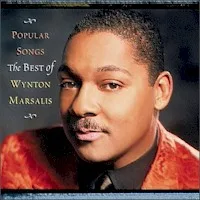Time: 64:33
Size: 147.8 MB
Styles: Trumpet jazz, New Orleans jazz
Year: 2015
Art: Front
[ 8:33] 1. Twilight
[ 6:06] 2. After
[ 6:30] 3. Insane Asylum
[ 5:59] 4. Knozz-Moe-King
[ 7:36] 5. Juan
[11:24] 6. Do You Know What It Means To Miss New Orleans
[ 2:37] 7. Cherokee
[ 8:12] 8. Goodbye
[ 7:31] 9. Foggy Day
Wynton Marsalis has been described as the most outstanding jazz musician and trumpeter of his generation, as one of the world’s top classical trumpeters, as a big band leader in the tradition of Duke Ellington, a brilliant composer, a devoted advocate for the Arts and a tireless and inspiring educator. He carries these distinctions well. His life is a portrait of discipline, dedication, sacrifice, and creative accomplishment.
The sound of Wynton Marsalis’ band is inspired by the basic principals of democracy. According to Marsalis, what you hear in a great jazz band is the sound of democracy. “The jazz band works best when participation is shaped by intelligent communication.” This intelligent, hard swinging interplay has made Marsalis’ bands the favorite among jazz musicians and audiences worldwide. In the smallest of towns Wynton is received warmly and enthusiastically. The connection is the music, which mimics our valued way of life. Through jazz music Wynton Marsalis represents America all over the world. In such disparate locations from Prague to Warsaw, Seoul to Wellington, Paris to Istanbul, Santiago to Mexico City, Toronto to Calgary, Amarillo to Portland - you will find Wynton Marsalis sharing his vision of the union of jazz and democracy.
Wynton was born in New Orleans, Louisiana on October 18, 1961 to Ellis and Dolores Marsalis. He was the second of six sons, one of whom is autistic. At an early age Wynton exhibited seriousness about study, an aptitude for music and a desire to contribute to American culture. At age 8 he performed traditional New Orleans music in the Fairview Baptist Church band led by legendary banjoist, Danny Barker. At 14 he was invited to perform with the New Orleans Philharmonic. During high school Wynton was a member of the New Orleans Symphony Brass Quintet, New Orleans Community Concert Band, New Orleans Youth Orchestra, New Orleans Symphony and on weekends he performed in a jazz band as well as in the popular local funk band, the Creators. At age 17 Wynton became the youngest musician ever to be admitted to Tanglewood’s Berkshire Music Center. Despite his youth, he was awarded the school’s prestigious Harvey Shapiro Award for outstanding brass student. When Wynton moved to New York City to attend Juilliard in 1979 and began to pick up gigs around town, the grapevine began to buzz. The following year (1980 ) he was rewarded with the opportunity to join the Jazz Messengers to study under master drummer and bandleader, Art Blakey. It was in Art Blakey’s band that Wynton learned the relationship between jazz and democracy. Art Blakey would always say, “No America, no jazz!” It was from Blakey that Wynton acquired his concept for bandleading and for bringing intensity to each and every performance. In the years to follow Wynton was invited to perform with Sarah Vaughan, Dizzy Gillespie, Sweets Edison, Clark Terry, Sonny Rollins, and countless other jazz legends.
The sound of Wynton Marsalis’ band is inspired by the basic principals of democracy. According to Marsalis, what you hear in a great jazz band is the sound of democracy. “The jazz band works best when participation is shaped by intelligent communication.” This intelligent, hard swinging interplay has made Marsalis’ bands the favorite among jazz musicians and audiences worldwide. In the smallest of towns Wynton is received warmly and enthusiastically. The connection is the music, which mimics our valued way of life. Through jazz music Wynton Marsalis represents America all over the world. In such disparate locations from Prague to Warsaw, Seoul to Wellington, Paris to Istanbul, Santiago to Mexico City, Toronto to Calgary, Amarillo to Portland - you will find Wynton Marsalis sharing his vision of the union of jazz and democracy.
Wynton was born in New Orleans, Louisiana on October 18, 1961 to Ellis and Dolores Marsalis. He was the second of six sons, one of whom is autistic. At an early age Wynton exhibited seriousness about study, an aptitude for music and a desire to contribute to American culture. At age 8 he performed traditional New Orleans music in the Fairview Baptist Church band led by legendary banjoist, Danny Barker. At 14 he was invited to perform with the New Orleans Philharmonic. During high school Wynton was a member of the New Orleans Symphony Brass Quintet, New Orleans Community Concert Band, New Orleans Youth Orchestra, New Orleans Symphony and on weekends he performed in a jazz band as well as in the popular local funk band, the Creators. At age 17 Wynton became the youngest musician ever to be admitted to Tanglewood’s Berkshire Music Center. Despite his youth, he was awarded the school’s prestigious Harvey Shapiro Award for outstanding brass student. When Wynton moved to New York City to attend Juilliard in 1979 and began to pick up gigs around town, the grapevine began to buzz. The following year (1980 ) he was rewarded with the opportunity to join the Jazz Messengers to study under master drummer and bandleader, Art Blakey. It was in Art Blakey’s band that Wynton learned the relationship between jazz and democracy. Art Blakey would always say, “No America, no jazz!” It was from Blakey that Wynton acquired his concept for bandleading and for bringing intensity to each and every performance. In the years to follow Wynton was invited to perform with Sarah Vaughan, Dizzy Gillespie, Sweets Edison, Clark Terry, Sonny Rollins, and countless other jazz legends.
Jazz Time




















